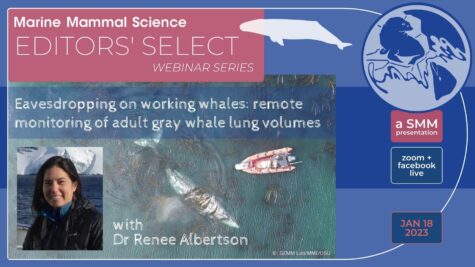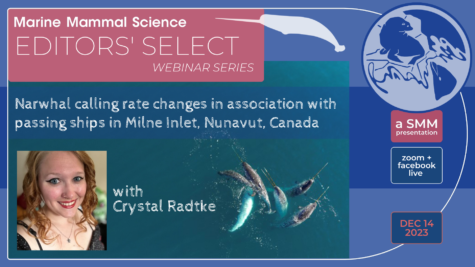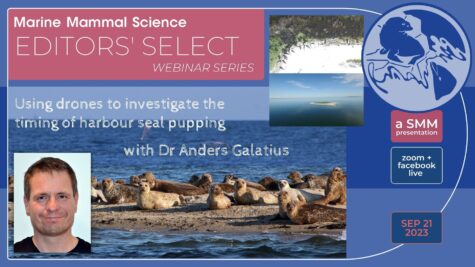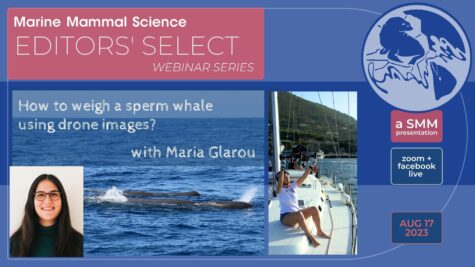
for the next SMM Editors’ Select Series Webinar:
Eavesdropping on working whales: remote monitoring of adult gray whale lung volumes
with Dr. Renee Albertson
This event was recorded live and put on youtube: https://youtu.be/aEOnLXq390Q
For future events, please check our news room or join the SMM Facebook page.
Understanding how a species’ metabolic rate varies in different behavioral contexts is useful for quantifying prey requirements and foraging efficiencies of individuals. Field metabolic rates (FMR) are daily estimates of oxygen consumption, which depend on three factors: lung capacity, breathing rate, and the amount of oxygen extracted from the air. This study describes a novel approach to estimating tidal lung volumes (VT) of actively foraging adult gray whales and compares those to VT estimates of gray whales studied in a winter breeding/calving lagoon. An unoccupied aircraft system (UAS) along the central Oregon coast monitored foraging whales from 2016-2020. Breathing patterns of gray whales typically include very rapid exhalation/inhalation events as they surface, followed by submerged breath holds of varying duration and depth. UAS video and acoustic recordings revealed that foraging whales have 35-40% higher mass-relative VT values than resting lagoon females. This reflects differences in behavior, activity levels, and oxygen needs between the two groups.
The tidal lung volumes of fasting lagoon whales and foraging whales fall between that of resting terrestrial mammals and small to medium-sized odontocetes. The methods described here, especially the use of UASs for measuring body lengths and breathing rates, provide a new tool for estimating gray whale oxygen consumption and energy requirements.
Dr. Renee Albertson is a teaching professor and research affiliate at Oregon State University, where her current research focuses on gray whale physiology. In collaboration with multiple scientists within the university’s Marine Mammal Institute, she has been studying gray whale metabolic rates and aerobic dive limits, including the research she will share today. Dr. Albertson earned BS degrees in Chemistry and Biochemistry and a MA in Teaching from Pacific University in 1994 and 1997, and taught high school chemistry from 1997 to 2007. She began her career in marine mammal science in 2005, when she completed an intensive internship in Moorea, French Polynesia working on photo-identification of small cetaceans and humpback whales. She went on to complete her MSc and PhD degrees at Oregon State University with Dr. Scott Baker, where she used genetic markers and photo identification to study migratory patterns and abundance of South Pacific humpback whales and phylogeographic patterns and taxonomic and social structures of rough-toothed dolphins. After completing her PhD in 2014 she worked as a postdoctoral scholar for Dr. Ari Friedlaender, where she evaluated changes in humpback whale migration and fine-scale population structure in the Western Antarctic Peninsula, one of the fastest warming areas on the planet. Today, in addition to her research, she teaches several field-based marine mammal courses at Oregon State University and continues to collaborate with scientists and policy makers in the South Pacific.



